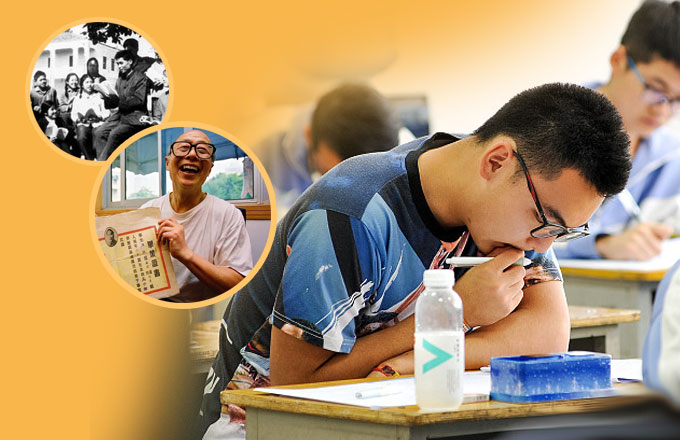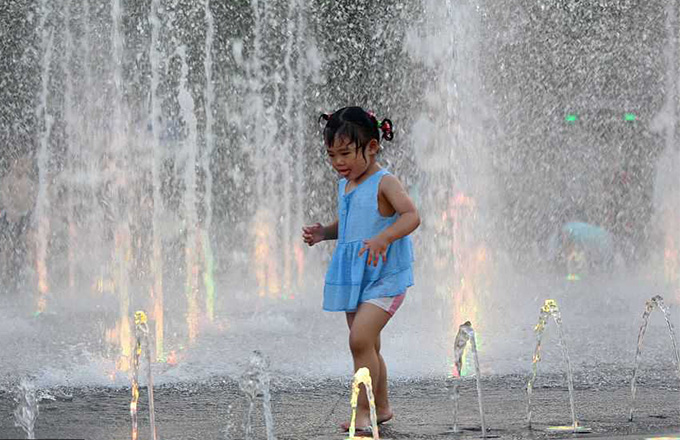Setting things right in education
September 19, 1977
Correspondents of Renmin Ribao (People's Daily) recently interviewed six comrades who had taken part in the 1971 National Conference on Education. They wrote a report on the way in which the ``Summary of the National Conference on Education'' was produced, a report that is well worth reading. The summary was revised by Yao Wenyuan and finalized by Zhang Chunqiao. Quite a few people disagreed with it at the time. The Renmin Ribao report supplies the facts concerning this issue.
The summary of the National Conference contained the so-called ``two appraisals'': the first was that during the 17 years prior to the start of the ``cultural revolution'' the bourgeoisie exercised dictatorship over the proletariat in the educational sphere, that is, there was ``dictatorship by the proponents of a sinister line''; the second appraisal was that the world outlook of the vast majority of intellectuals was basically bourgeois, that is, they were bourgeois intellectuals. Really, how should we look at these questions? In all spheres of work, including those where intellectuals are concentrated, the line represented by Comrade Mao Zedong was dominant during the first 17 years after the founding of our People's Republic in 1949. Can it be that your sphere, the educational sphere, was the only exception? True, Comrade Mao Zedong read and made a mark of endorsement on the summary. But that doesn't mean that it was necessarily correct in every respect. We mustn't over-simplify. The 1976 resolution on my case, adopted in connection with the Tiananmen Incident, was similarly endorsed by Comrade Mao Zedong. In view of the very large numbers of people involved in the Tiananmen Incident, it definitely cannot be labelled counter-revolutionary. And I myself was described as the ``behind-the-scenes boss'' of this incident, although as a matter of fact I was cut off from any contact with the outside world at the time. Some of Comrade Mao Zedong's statements were quoted in the summary, but in many cases they were quoted out of context. Furthermore, a lot of the ideas peddled by the Gang of Four were injected into it. So we should criticize this summary, distinguishing right from wrong. We should have a correct and comprehensive understanding of Mao Zedong Thought as a system. Apparently, there are people who object to my posing this issue. It is common knowledge that Marxism-Leninism as a system should be understood correctly and comprehensively. Shouldn't the same thing apply to Mao Zedong Thought? Of course it should, otherwise mistakes will be inevitable. Comrade Mao Zedong wrote the four-word motto ``Seek truth from facts'' for the Central Party School in Yan'an, and these words are the quintessence of his philosophical thinking.
The ``two appraisals'' in the ``Summary of the National Conference on Education'' do not accord with reality. How can we dismiss nearly 10 million of China's intellectuals at one stroke? Weren't most of the professionals now at work trained in the first 17 years after 1949? China's first atomic bomb was successfully tested in 1964, and its first hydrogen bomb was exploded in 1967, but these things were not achieved overnight. The basis for them was laid through the implementation, under Comrade Nie Rongzhen's guidance, of the 12-year plan drawn up in 1956 for the development of science. You people in charge of educational work have yet to emancipate your minds. Burdened with the weight of the ``two appraisals'', you don't speak out in defence of the masses of intellectuals, and you are likely to stumble in your work. Educational workers in general are complaining about your Ministry of Education, and you ought to know why. You should speak out boldly. My talk on August 8 this year at the forum on scientific and educational work was a bold speech, but of course it also made due allowance for current realities. Some people have taken exception to what I said, but that's all right. A principle or policy will invariably arouse the opposition or disagreement of some people. It's good for them to air their views boldly, because then we can talk things out.
Comrade Zhou Enlai was in a very difficult position at the time of the 1971 National Conference on Education. In 1972, talking with an American physicist of Chinese descent, he said that college students should be recruited directly from among graduates fresh from the senior middle schools. It took some courage to make this point under the prevailing conditions. Comrade Zhou Enlai wanted to bring about a sharp change in the educational departments, but no such change was made. Why should we enrol students directly? The answer is simple: so as not to break the continuity of studies. The best period for a person to study is between the ages of 18 and 20. In the past, talking with foreign guests, I too stressed the advantages of having secondary school students do physical labour for two years after graduation. Facts have shown, however, that after a couple of years of labour, the students have forgotten half of what they learned at school. This is a waste of time. Direct enrolment of college students doesn't mean discarding labour. Labour should be incorporated in the programme of the primary and secondary schools. It is good to inculcate the love of labour from an early age. For college students the emphasis should be on participation in labour that is related to their studies. They may also take some part in agricultural labour, but they should not be required to do too much.
We should have a correct understanding of Comrade Mao Zedong's ``July 21st Directive''. Universities and communist labour universities should be run by the provinces themselves, and each should work out its own methods. Also, graduates of these universities do not fall under the unified state plan for job assignment. But I'm afraid Qinghua and Beijing Universities can't be run along these lines. By no means should all colleges and universities follow the example of the Shanghai Machine Tool Plant. Comrade Mao Zedong always stressed the necessity of raising scientific and cultural standards. He never said that it was unnecessary for universities to ensure the quality of the education they offered, unnecessary to increase the students' scientific and cultural knowledge or unnecessary to produce trained personnel.
The Ministry of Education should take the initiative. So far you have not done so, and, at the very least, this shows that you are overcautious and afraid of making further ``mistakes'' by following my advice. Although I realized it would be a tough job to be in charge of scientific and educational work, I volunteered for the post. China's four modernizations will get nowhere, will become mere empty talk, if we don't make a success of such work. But to get a grip on it, we need to have specific policies and measures, and we need to solve specific ideological and practical problems. You should work freely and boldly, and think independently instead of always looking over your shoulder. You should get clear on the problems involved and then do what's necessary. You should solve whatever problems you can on your own and report the others to the Central Committee of the Party. The problems that have piled up in the educational sphere must be sorted out. Now that the masses are full of enthusiasm, the Ministry shouldn't stand in their way. The most important thing for the Ministry to do is to achieve a consensus. Those comrades who are in favour of the policies of the Central Committee should get on with the job, and those who aren't should switch to other lines of work.
We must improve the organization of the Ministry of Education. We should have a number of people about the age of 40 whose duty is to make the rounds of the schools. We should have 40 people specializing in this work -- or, at the very least, 20. Like commanders going down to the companies, they should sit in on classes as ``pupils'', familiarize themselves with the real situation, supervise the implementation of plans and policies, and then report back. This is the only way for them to find out promptly what's going on in the schools and to solve problems quickly. A beginning might be made by going to the key colleges, universities and secondary and primary schools. These are the concrete measures we should take. We can't afford to be satisfied with idle talk.
The problem of the workers' propaganda teams should be solved, because they can't feel comfortable continuing their work in the schools. Armymen sent to carry out the task of ``supporting the Left'' should, without exception, return to their own units. Unless these problems are solved, there will be endless wrangling in the schools.
How many key colleges and universities should there be? Who should be in charge of them? And how should they be organized? As I see it, key colleges and universities should be under the Ministry of Education. Those directly under the Ministry will, in fact, have dual leadership [leadership by the Ministry and by the governments of the provinces and municipalities where the schools are located], but the Ministry will provide the principal leadership. The Ministry should also take direct charge of a few schools and see that they set an example. The number of class hours per week, the maximum number of hours for political activities, and so on, should be decided upon, and the Ministry should be directly involved in the decisions. The People's University of China should be started up again, mainly to train personnel in finance, trade and economic management, as well as to train Marxist-Leninist theorists. We should make sure that the teachers' training universities fulfil their function well, and the Ministry of Education should regularly send people to inspect teachers' training colleges and schools under the provincial and municipal administrations. Unless all these institutions are run well, there will be no source of teachers.
A basic consensus has been reached with regard to the length of undergraduate schooling: in general, it should be four years, although it may be somewhat longer for students of medicine and in certain other specialized fields. Within that four-year period, two or three years should probably be spent on basic subjects. It is hard to do scientific research if you don't have a sound foundation. I've read your brief reports on the teaching materials used in foreign countries. It seems to me that in revising our own materials we must start with those for the primary and secondary schools, and that such materials should reflect the latest developments in knowledge. We must not, of course, divorce ourselves from the actual conditions in China.
The document you've drafted on the enrolment system is too complicated and hard to understand. I've made a few changes in the qualifications required of applicants. So far as political requirements are concerned, we should stress the applicant's own political conduct. A clear political record, love of socialism and labour, readiness to observe discipline and a determination to study for the revolutionary cause -- that is all we should require. In short, we should have two main criteria for admitting college students: first, good conduct; and second, a good academic record.
For our scientific research institutes, we've decided to adopt a system whereby the director assumes overall responsibility under the leadership of the Party committee. We've also decided to restore the professional titles of scientific research personnel. These are major policy decisions and they have solved many important problems; they are bound to shake things up and have an impact on education, industry and other spheres. The educational units should try to keep pace with these developments. In colleges and universities, the titles of professor, lecturer and assistant should be restored. The question of reinstituting the system of professional titles has been on many comrades' minds for years. Recently, this question was settled by the Central Committee in its circular on the convening of a national conference on scientific work.
The departments of support services in organizations devoted to scientific research and education are indispensable; they have an immense load, and their work directly involves the implementation of policies. These departments in our colleges and universities should be staffed by people who love their jobs and are ready to work diligently in the service of teaching and scientific research. This will make it possible for those engaged in teaching, study or research to devote their energies to their professional work instead of running around looking for necessary equipment and suitable working conditions.
We must strengthen our corps of teachers. We may transfer some of the personnel now working in scientific research institutions to colleges and universities so that they too can contribute to education. Teaching is a glorious task, and we should encourage all those engaged in it to work enthusiastically. The Ministry of Education should make proper political and material arrangements for those comrades who are released from the scientific research institutions to join the ranks of teachers. From now on we should focus greater attention on co-ordinating scientific research with education and on effecting a regular interchange of people between the two fields. Without this kind of mobility, personnel will become rigid in their thinking. Scientific research institutions in foreign countries take great pains to revitalize their ranks by regularly bringing in bright, active young people. We, too, should gradually institute a system of interchange and renewal of personnel. We should be on the look-out for capable persons. At present, the achievements of some of our scientific personnel are recognized by foreigners before we ourselves know about them. This points up shortcomings in some of our institutions which may prevent us from discovering talent. We should try conscientiously to remedy this situation.
Over the next eight to ten years we should bend all our efforts to educational work. For my part, I intend to pay close attention to it, keeping an eye on the leading comrades in the educational departments and seeing that the right principles are followed. I am also going to concern myself with the significant specific policies and measures, because they are related to the general principles. The many problems in the field of education can all be reduced to this: How can we train qualified personnel and bring about the other desired results?
In a word, the Ministry of Education should emancipate its thinking and take the initiative into its own hands. If anything you said in the past was wrong, you can issue a new statement correcting it. To set things to rights, the language must be clear-cut. We can't afford to be ambiguous -- that doesn't solve problems. You must act quickly on these matters and not let things drag on.
(A talk to the principal leading comrades of the Ministry of Education.)
(From Selected Works of Deng Xiaoping, Volume II <1975-1982>)
- China issues guidelines to develop 'all-for-one' tourism demonstration zones
- Torrential rain triggers disaster in Southwest China
- Harvest time for wheat reapers in Shanxi
- Over 200 couples marry in Changchun group wedding
- Calligraphy tops other icons of Chinese culture, WeChat data shows

























